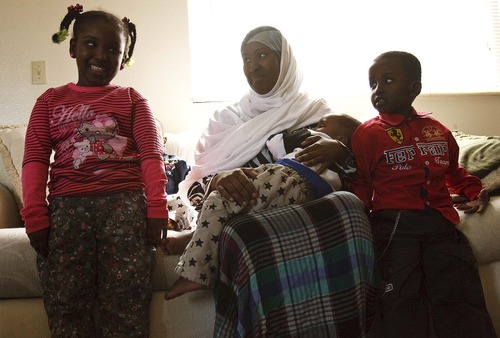This is an archived article that was published on sltrib.com in 2012, and information in the article may be outdated. It is provided only for personal research purposes and may not be reprinted.
Though her husband disappeared, her father-in-law was murdered and she was forced to flee Somalia pregnant, with three young children in tow, Ferdows Omer still calls herself a lucky woman. Beating odds that are tougher today than years ago, the 26-year-old single mother and her family received refugee status and arrived in Utah two weeks ago to begin a new life.
The number of refugees coming to America has sharply declined in the past two years, as security measures have increased for newcomers coming from some of the most turbulent parts of the world.
"As credible threat information emerged, we had to enhance our screening process for the refugee program in order to make sure we were keeping our country safe," said Deborah Sisbarro, public affairs adviser for the Bureau of Population, Refugees and Migration, which is part of the U.S. State Department.
The decrease in arrivals — nearly 17,000 fewer refugees in 2011 than in 2010 — follows the high-profile arrest of two Iraqi refugees in 2011 on terrorism charges after they were resettled in Kentucky. They allegedly planned to send weapons to anti-American insurgents in Iraq. The FBI caught them in a sting. One of the men had left his fingerprints on an unexploded roadside bomb in Iraq before coming to the U.S. as a refugee.
Refugees are legal immigrants brought to the U.S. due to persecution or threat of persecution. Iraqis and Somalis are two of the largest groups arriving in recent years, both hailing from regions where terrorism concerns remain high. Verifying an applicant's identity can be extremely difficult when no legitimate government exists or records are inaccessible.
In 2011, 56,424 refugees arrived in the U.S., compared with 73,311 the year before.
Halfway into this federal fiscal year, the U.S. has welcomed 21,836 refugees, though federal officials continue to assure resettlement workers that numbers will climb.
Utah welcomed 836 refugees in 2011 versus 1,100 in 2010. The International Rescue Committee in Salt Lake City saw its Iraqi arrivals drop from almost 150 people in 2010 to 59 in 2011.
The decline has forced the IRC, one of a handful of resettlement agencies in Utah, to shrink its staff. Each refugee comes with about $700 from the federal government. The agency is down four caseworkers and an office assistant due to a combination of layoffs and attrition.
"For us, resettlement really is lifesaving," said Patrick Poulin, the executive director at IRC in Salt Lake City. "We know we have the capacity to serve more people — this community has the capacity to serve."
Some refugees are stuck in what one advocacy group calls the "cycle of despair." Told they are approved for resettlement to the U.S., they may sell their assets, pack belongings, take children out of school but then learn the process is delayed or halted for unexplained reasons. Various clearances, from health to security, may expire during the delay, further dragging out the process when they need to be repeated.
"Security is paramount here, but I think you can balance security with a healthy program that really protects the vulnerable," said Kevin Appleby, director of migration policy for the U.S. Conference of Catholic Bishops.
Iraqis in Utah frequently talk of family in Syria and other countries where their lives are in limbo, though they've been told they have a green light to come to the U.S.
"Why can't we make it more efficient?" asks Aden Batar, refugee resettlement director at Catholic Community Services in Utah. "You don't keep an individual for a year or two years when their refugee case has already been approved."
In consultation with Congress, the White House recommends an annual refugee limit, which stands at 80,000 for 2012.
"I think we have to honor our commitment," said Batar, whose agency has not laid off staff but has spent more time with other vulnerable populations, such as victims of human trafficking.
Omer, the Somali mother, is thankful for the new life her four children will have in Utah, though she has no idea what happened to her husband, a former member of the Somali army. He jumped out of a window in their house in Mogadishu, fleeing from al Shabaab, a militant Islamist group. She says they killed her husband's fathe, and she was told to leave as well if she wanted to live.
"I am happy to be here because my children will be safe and get a good education here," Omer said through a translator, holding her sleeping 1-year-old son in her arms. "Here, the people appreciate the human beings."
The family spent 20 months as refugees in Turkey before arriving in Utah in April, where books, pens and playgrounds are the favorite parts of their new life for her oldest daughter, Naval Mualim.
Though the 6-year-old pigtailed girl doesn't understand English, she already knows two words to describe her new country: "It's cool," she said.
Do you want to help refugees?
Resettlement and advocacy agencies are in need of donations and volunteers. Learn more online. › refugee.utah.gov —
Open house
P The International Rescue Committee moved to a new Salt Lake City office in April. Now at 221 S. 400 West, the agency will hold an open house May 16 from 5 p.m. to 7 p.m. The new office provides more space for classes and to train both volunteers and refugees.







